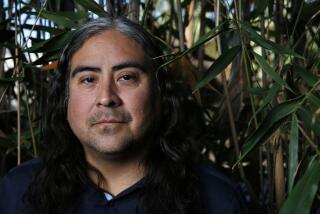Tavener Premiere Divinely Inspired, Performed
- Share via
Abstract music is anathema to John Tavener. Since at least his conversion to the Eastern Orthodox Church in 1977, the British composer has regarded music as a process of refinding God.
So to say that his “The Bridegroom” received a beautiful North American premiere performance by Anonymous 4 and the Chilingirian String Quartet on Friday--which it did--is to say nothing that would interest him.
Perhaps he would be happier to hear that it fit the space--St. Paul’s Greek Orthodox Church in Irvine--as perfectly, as appropriately as the iconic imagery of the just-finished mosaic of the Last Judgment (by Sirio Tonelli) installed in the dome of the church, and that nothing else on the five-part program did.
The text is based on the parable of the Wise and the Foolish Virgins. Another composer might deliver its urgent and fearful message with loud threats and dire warnings. Tavener strips any semblance of such a personal voice from the pure, suspended, floating vocal lines, which seem to have been going on forever. But the message is no less urgent for that.
The string quartet keeps responding with an amen cadence reminiscent of a phrase in Gorecki’s “Symphony of Sorrowful Songs.” (The two composers probably worked from a common liturgical tradition.)
The singers repeatedly touch their hands to their hearts as if acknowledging the divine presence. It may sound stagy, but it looked devotional, natural and inevitable.
The singers were Marsha Genensky, Susan Hellauer, Jacqueline Horner and Johanna Maria Rose. The quartet members were violinists Levon Chilingirian and Charles Sewart, violist Asdis Valdimarsdottir and cellist Philip De Groote.
By comparison, Arvo Part’s “Fratres” (played by the quartet) seemed feeble and contrived. Four a cappella excerpts from the compiled “1000: A Mass for the End of Time” sounded inappropriately luxurious and sensuous.
Only two other composers held their own in the church. Britten’s Missa Brevis offered a spiky contemporaneity, but the singers sounded rather pale as imitators of boy choristers. Stravinsky’s Three Pieces for String Quartet and Concertino for String Quartet displayed a crackling human energy and life, but especially the earthy character vignettes in the Three Pieces seemed a world apart from Tavener’s devotional quest.
More to Read
The biggest entertainment stories
Get our big stories about Hollywood, film, television, music, arts, culture and more right in your inbox as soon as they publish.
You may occasionally receive promotional content from the Los Angeles Times.










